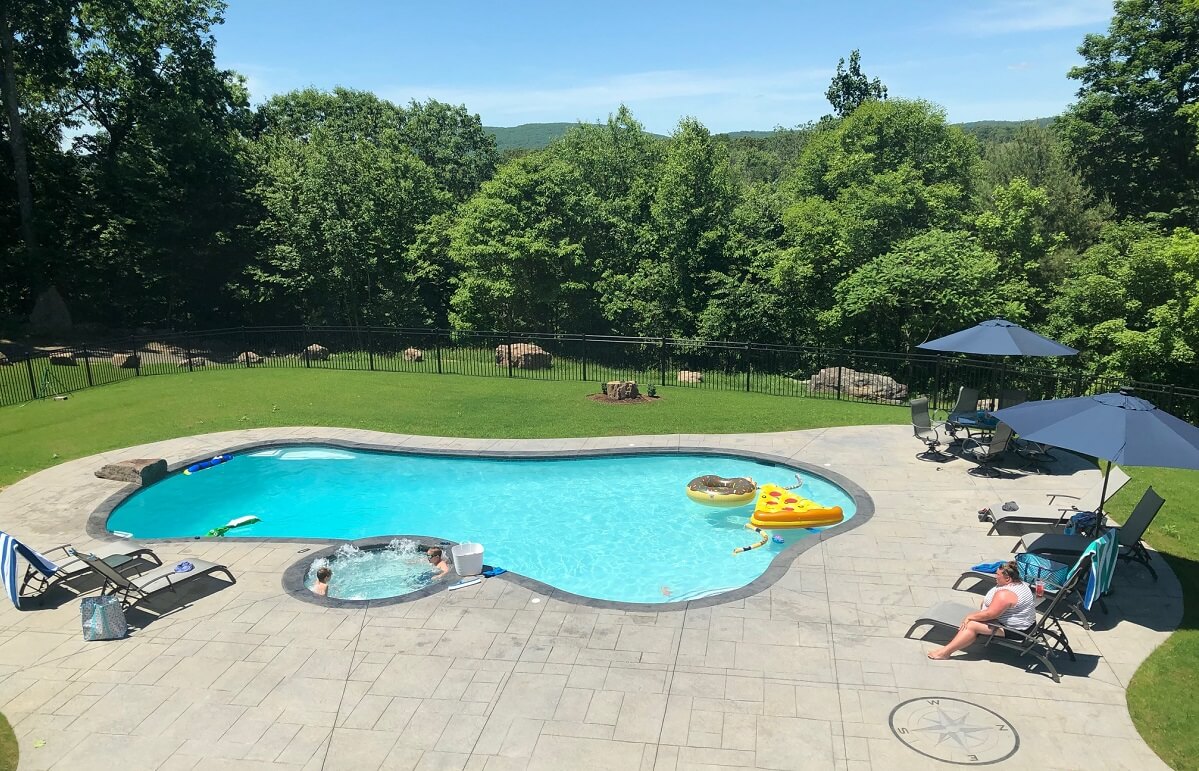Summer Pool Maintenance—Have You Tested Your Pool’s Water?
One of the greatest joys of summer is cooling off in a refreshing swimming pool on a hot day. However, since your pool is used most heavily during the summer months, staying on top of routine maintenance is even more important than at other times of the year. In addition to swimmers altering the water chemistry, warm temperatures and lots of sunlight can promote algae growth, while flourishing plant and insect life can increase the amount of debris that makes its way into the pool. Therefore, in order to keep your pool safe, sparkling, and ready for your enjoyment all season long, follow these important summer maintenance steps:
Test the water chemistry regularly.
Ensuring that your pool has proper pH and chlorine levels is one of the most important steps you can take to maintain the cleanliness of the water. Chlorine is essential for killing viruses and bacteria—including harmful pathogens like E. coli—and warding off algae. However, having too much chlorine can cause irritation to swimmers. To make sure that your pool is properly chlorinated, check at least two or three times per week to verify that the level of free chlorine stays between one and three parts per million (ppm).
A pool’s pH represents the acidity of the water. The optimal pH is between 7.4 and 7.6; when the levels deviate from this range, the water may become cloudy, irritating to swimmers’ eyes and skin, and damaging to pool equipment. The pH levels should also be tested two to three times per week, or as often as every day if the pool is being used heavily.
In addition to chlorine and pH, your pool’s alkalinity and calcium hardness should also be tested regularly. This process is best left to the professionals. Test your water at Aqua Pool’s storefront or similar high-quality pool stores. We use a specialized software that takes Chlorine and pH into account, something that store-bought test strips do not do. To prevent damage to your pool’s structure and equipment, check calcium levels at least once a month to ensure that calcium hardness is between 250 and 300 ppm. Keeping alkalinity between 80 and 120 ppm is essential for maintaining proper pH, so test your pool’s total alkalinity at least once a week.
Keep the skimmer basket clean.
Located on the side of the pool, the purpose of the skimmer and skimmer basket is to collect debris and contaminants before they become saturated and sink to the bottom of the pool. When the basket becomes filled with debris, it cannot work effectively. Therefore, it’s important to check the basket regularly and remove anything that has accumulated.
Clean the filter.
While the skimmer removes larger debris from the pool, the filter cleans out finer pollutants, such as algae, dirt, dust, and microorganisms. Most pool filters are made from sand, cartridges, or diatomaceous earth, and the method for cleaning your filter—and the frequency with which you need to do so—depends on its type.
Brush and vacuum the pool.
At least once a week, brush the sides of your pool and vacuum the bottom in order to remove debris and algae. In addition, be sure to check cracks and crevices for signs of algae growth.
Check the water level.
The water level in your pool can fluctuate from day to day, as it is impacted by natural factors like rain or evaporation and activities such as vacuuming. If the water level drops too low, the filter could begin to suck in air, causing the pump to burn out. If it is too high, on the other hand, the skimmer could function less effectively, causing debris to accumulate in the pool. Ideally, the water level should fall at the center level of your pool tiles or skimmer.
Keep the area surrounding your pool tidy.
Dirt and debris from trees and plants around your pool area could blow into the pool, so be sure to keep the surrounding area tidy.
Talk to you landscapers!
Fertilizers tend to cause issues with pool water. We often see pools with high levels of phosphates in the water and quite often the cause is “inconsiderate” application of fertilizers. Fertilizers are full of phosphates and will create issues with chlorine (including salt-water pools).
A Word on Phosphates
We are finding more and more pools are being adversely affected by high levels of phosphates in the water from fertilizers and municipal water. Phosphates in the water cause the chlorine to be absorbed (eaten) an unable to do its job. If you are fighting with water clarity issues, or algae, MAKE SURE to have the water tested for phosphates. If you would like more information or to learn more about it, please call our office at (860) 623-9886.
Consult pool care professionals.
Keeping your pool in pristine condition throughout the summer can be overwhelming. To minimize your workload and maximize the amount of time that you can spend simply enjoying your pool, contact the professionals at Aqua Pool & Patio! Our pool maintenance programs may be customized to provide as much or as little assistance as needed. We will keep your pool healthy and sparkling throughout swimming season, and can help close it in the fall. We also offer free water testing for area residents—just bring a sample of your pool water to our East Windsor location and we will let you know if any chemical adjustments are needed! Call us today at (860) 623-9886 to learn more about what we offer.




